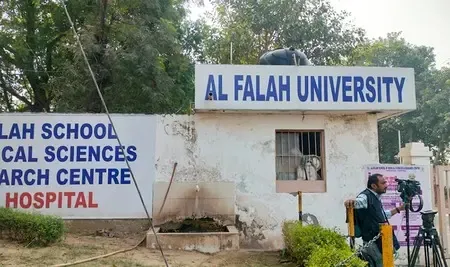Why has a Delhi court placed Al-Falah University's founder in 13-day ED custody?

Synopsis
Key Takeaways
- Jawad Ahmed Siddiqui arrested for money laundering tied to terror financing.
- ED claims Al-Falah University engaged in fraudulent practices for years.
- Students misled about the institution's NAAC accreditation status.
- ED seeks to uncover a broader laundering network.
- Custodial interrogation considered essential for investigation.
New Delhi, Nov 19 (NationPress) A Delhi court has placed Jawad Ahmed Siddiqui, the founder of Al-Falah University and Chairman of the Al-Falah Group, under 13-day Enforcement Directorate (ED) custody due to his involvement in a money laundering case linked to terror financing.
Siddiqui was taken into custody on Tuesday as part of the agency's active investigation into significant financial discrepancies at the university.
The court remarked, "The accused, Jawad Ahmed Siddiqui, is committed to ED custody until December 1."
The ED's plea highlighted that the inquiry into alleged fraudulent recognition and misleading statements made by the university unveiled a pattern of admitting students under false representations for several years, along with the collection of substantial sums of money through these unethical practices.
Officials from the ED noted that an examination of Income Tax Returns disclosed that the university reported earnings amounting to several crores from the financial years 2014–15 and 2024–25.
Particularly alarming were the financial records for FY 2014–15 and 2015–16, during which the university claimed Rs 30.89 crore and Rs 29.48 crore, respectively, as "voluntary contributions."
From FY 2016–17 onwards, however, the university started categorizing its income as revenue derived from its primary educational services. The ED asserts that this change signifies a calculated effort to obscure prior irregularities.
Further financial analysis indicated substantial revenues in subsequent years, including Rs 24.21 crore in FY 2018–19 and Rs 80.01 crore in FY 2024–25.
In total, the ED alleged that around Rs 415.10 crore was accrued through what it referred to as "fake accreditation" and misleading claims of statutory recognition.
The agency accused the university of failing to uphold the trust and legitimate expectations of students by misrepresenting its National Assessment and Accreditation Council (NAAC) status and falsely asserting undergraduate recognition under Section 12(B).
The ED emphasized that these misrepresentations have caused irreversible damage to the lives and career opportunities of numerous students who believed in the institution's claims.
According to the agency, students invest their most formative years and their families' financial resources based on the credibility of an educational institution, and false recognition leads to diminished degree value, loss of eligibility for higher education and government positions, financial difficulties, and emotional distress.
In its remand application, the ED argued for Siddiqui's custodial interrogation, stating that it was necessary "to uncover additional proceeds of crime, reveal vital evidence, and identify other parties involved."
The agency also pointed out the risk that the accused might attempt to flee, sway witnesses, or tamper with evidence if not kept in custody.
The ED requested a 14-day custody, emphasizing the scale of the alleged financial misconduct, the number of individuals who require confrontation with the accused, and the case's sensitivity.
The agency indicated that multiple family members and close associates serve as trustees, directors, or office bearers across Al-Falah University and affiliated entities.
However, the evidence gathered thus far suggests that Siddiqui maintained control over all critical decisions, including those related to the university's allegedly fraudulent accreditation claims, fee collection processes, and the allocation of funds into assets and properties.
The ED concluded that Siddiqui's custodial interrogation is crucial to mapping the "entire laundering network" and ensuring accountability for all involved parties.









